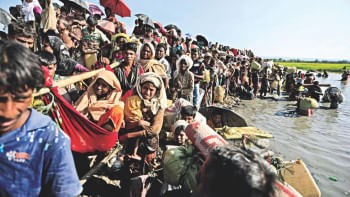WHO
WHO urges swift action as dengue cases surge in Bangladesh
A significant surge in dengue fever cases has gripped Bangladesh, the UN World Health Organization (WHO) reported on Friday, calling for efforts to control the mosquito vector population and minimise individual exposure such as using mosquito repellents and wearing long-sleeved clothes
Bangladeshi film wins Grand Prix award at WHO’s film festival
Nearly 800 filmmakers from 106 countries had submitted short films for the 4th edition of the WHO Health for All Film Festival.
Stop killing our 'sign of life'
Better water management can nourish people's lives
A woman dies every 2 minutes due to pregnancy, childbirth: UN report
"These new statistics reveal the urgent need to ensure every woman and girl has access to critical health services... and that they can fully exercise their reproductive rights"
The impossible task of calculating global pandemic deaths
December's WHO calculations of excess deaths during the pandemic highlight a big, but largely unseen, problem in global health: Lack of proper mortality surveillance in half the world's countries.
What’s a healthcare system without data? Simply incomplete.
An informed public health professional will argue that public health is half medical and half data. Without data, any health system is effectively blind. Data provides visibility into public health emergencies and non-emergencies alike. It saves lives. It tells us where the government needs to pour its funds and which areas to mobilise resources in. It helps identify gaps in healthcare and measure outcomes. Indeed, data is the eyes and ears of public health.
Drowning 2nd leading cause of death for Bangladeshi children under 5
Each year, over 14,000 children in Bangladesh die due to drowning. Although largely unrecognised, drowning is the second leading cause of death for children under the age of five in the country, making it a major public health problem.
Bangladesh No. 1 recipient of Covid vaccines from Unicef under Covax
Unicef delivered over 190 million doses of Covid-19 vaccines to Bangladesh through Covax in one year.
Monkeypox outbreak won't lead to another pandemic: WHO
The World Health Organization does not believe the monkeypox outbreak outside Africa will lead to a pandemic, an official said on Monday, adding it remains unclear if infected people who are not displaying symptoms can transmit the disease.
WHO seeks int'l support for Rohingya refugees
The World Health Organization has appealed to the international community to contribute generously to enable appropriate and timely
Bangladesh among abstinent Asian countries when it comes to drinking
An average citizen in Bangladesh and Indonesia drinks hardly a bottle of wine in a year. Whereas, the lowest alcohol consumption is reported in Pakistan at nearly 0, and people in South Korea are the most prolific drinkers in Asia.
Dengue Vaccine: Relief turns into worry
The world's first ever vaccine to prevent dengue fever works just fine on those who had contracted the disease before, but brings trouble to the people who were never infected by the virus.
24.4m not getting enough right food
Every seventh person in Bangladesh is an undernourished one who cannot acquire enough food to meet dietary energy requirements.
Pollution: killer of children
According to the World Health Organisation (WHO), pollution in its many manifestations is killing some 280,000 children in Bangladesh annually.
Football: Smog may force U-17 football World Cup out of Delhi
FIFA could pull Under-17 World Cup matches out of New Delhi because of concerns over air quality in the world's most polluted capital city, the tournament director said.
Monsoon and the mosquito menace
Mosquitoes are a pest with no equal. Though not all mosquitoes transmit life-threatening diseases, those that do kill approximately 725,000 people worldwide every year. When not fatal, the diseases mosquitoes spread can result in bouts of debilitating fever, nausea and vomiting, compromising immune systems and disrupting economies. The WHO South-East Asia Region is particularly affected.
Long jump champ Rutherford freezes sperm over Zika fears
Olympic long jump champion Greg Rutherford decides to freeze his sperm because of fears about the Zika virus at this year's Games in Rio de Janeiro.
WHO seeks to allay Zika Olympics fears
The World Health Organization (WHO) plays down concerns over the spread of the Zika virus, amid calls for the Rio Olympics to be postponed.
Zika outbreak will worsen before it gets better: WHO
The head of the World Health Organization warns that the Zika outbreak would likely worsen before nations besieged by the mosquito-borne virus linked to thousands of birth defects in Brazil see relief.











